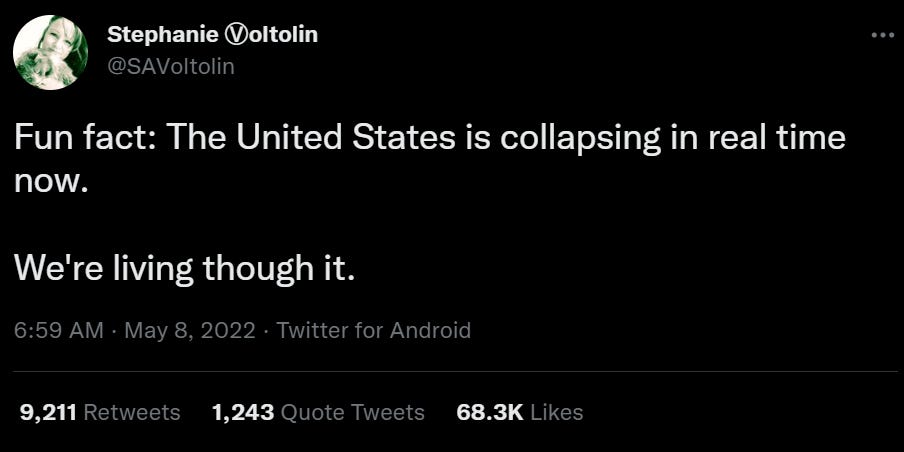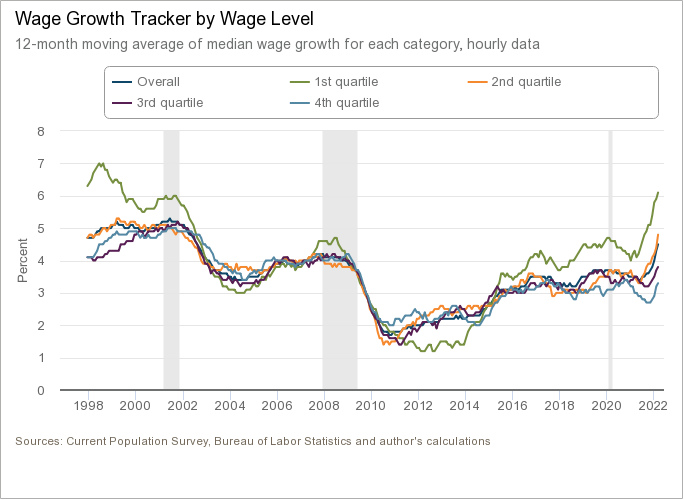Yes, I’m upset that the Supreme Court looks set to overturn Roe v. Wade. I believe in abortion rights, and at some level most other Americans do too. I think there’s going to be a big, long, and 100% justified backlash over it, and if activists play their cards right, they will eventually prevail. I’m obviously unhappy about the number of Americans who will suffer in the meantime, but living in a democracy is tough, and sometimes things that should take a day end up taking decades.
But in any case, the leaked SCOTUS opinion seems to have produced another explosion of apocalyptic rhetoric about how America is collapsing. This kind of stuff isn’t new — my Latin teacher told me that America was declining and falling just like Rome, and that was back in 1995. But now we have Twitter, so this rhetoric gets blasted out to millions of eyeballs and every journalist and politician in the land, while being amplified by every 13-year-old troll and foreign info-op account. Here are a couple of today’s juiciest examples:

These threads (the second is locked so I can’t post the tweet in Substack) are a good juxtaposition, because their content is completely different. The first one is about the difficulty Democrats have getting laws through the Senate, thanks to the filibuster and to rural state overrepresentation. The second one is about the fall of American “empire” and our military pullout from Afghanistan. The thread writers agree that the nation is collapsing, they just have totally different ideas of what collapse entails.
I realize that to a large extent, “doomerism”, as the kids call it, is just self-expression. We just went through a massive pandemic that killed a million of us, we had an era of riots and coup attempts and random acts of terrorism, crime is high, inflation is eating away at people’s paychecks and savings, and there are rumblings of major war from overseas. It’s a stressful time, and on top of that we have a bitter political and cultural divide here at home. It makes sense that people feel a need to express their rage and despair, and histrionic Twitter threads are one way of doing that.
Nor do I want to deny that the country faces real risks. If WW3 starts, that’ll be a calamity. We could also have a civil war in 2024-5 over a disputed presidential election result. It’s even possible that inflation could spiral out of control and turn us into Venezuela.
But these things, while risks, are still tail risks. The overall trends don’t show any such collapse.
The economy is not collapsing
The most important fact about the economy right now is that pretty much everyone has a job. Once we control for the Baby Boomer retirement by looking only at the “prime age” population between 25 and 54, we see that the percent of Americans with a job is very high in historical terms:
And people have more income, too. Real (inflation-adjusted) disposable personal income spiked when the government doled out giant Covid relief bills in 2020 and 2021, and has since come down. But it’s above where it was before the pandemic hit. And now lots of Americans have savings from the relief bills as well (in fact, them spending these savings is one thing fueling inflation).
Now, this would be cold comfort if the extra income were just going to the rich. For many years in America, inequality went up and up. And it’s still pretty high. But the current economy is working against inequality. For one thing, wages for low-earning workers are strongly outpacing wages for everybody else:
In 2021, this wage growth for the folks at the bottom was high enough to outpace inflation.
And even as the poorest Americans gain, the fortunes of the wealthiest have come down. Bloomberg reports that the world’s richest 500 people have lost a total of $1 trillion this year. That’s not to say that rich people losing money is a good thing in and of itself (in fact, the rich people themselves probably don’t even notice the loss that much). But it does indicate that the very real economic gains America has been seeing haven’t mainly been flowing to the wealthiest among us.
None of this looks like a collapse to me.
Society is not spiraling into chaos
Yes, we had some huge protests and riots in 2020. Yes, crime is way up. We even had a (shambolic, ridiculous, halfhearted) coup attempt. Yes, there’s even a slight danger that a disputed 2024 election could lead to civil war. I do not deny any of these things.
But let’s take a hard-headed look at the data here. The Floyd protests — the biggest in our history — did involve some riots, but the number of people killed nationwide was far less than the number killed in one single-city riot in Los Angeles in 1992. I wrote a post about this last year:
Next, crime. Yes, violence is way up. But if we look specifically at murder — the most consistently reported crime — it’s only about halfway back to the levels of the 80s and 90s, which we now look back on as a golden age of American harmony and stability.
Political violence, too, is not that high in a historical sense. There has been no wave of assassinations as in the 1960s. And though the FBI is catching a lot more terrorist plotters these days, actual fatalities from terrorism are drifting down from their recent peak in 2016:
And while hate crimes have increased somewhat, they’re just back to the level of the 2000s.
In other words, while America is still an unusually (and unacceptably) violent society for a rich country, it does not look like a society spiraling into a state of social collapse.
American power is not collapsing
Now let’s look at foreign affairs — the thing Stephanie Voltolin was worried about.
Yes, the U.S. pulled out of Afghanistan and the Taliban retook the country. But in fact, this was a smart move on our part. After killing bin Laden and destroying al Qaeda as a serious threat — and withdrawing most of our forces by 2015 — there was just nothing left for us to do there. It is probably impossible to build a country into a modernized, peaceful inclusive democracy by keeping it under military occupation. And even if it were possible, it’s just not the kind of thing America specializes in doing — and never has been. I wrote about this in a post last year, arguing that the U.S. is fundamentally not an empire and that we don’t do nation-building:
The people who think the Afghanistan pullout was some kind of imperial defeat need to think about the alternative they would consider a “success” — the permanent occupation and rule of a country that, overall, did not want to be ruled by us. To me that sounds like no kind of victory at all.
And crucially, withdrawing from Afghanistan allowed us to more easily focus on regions that are core to our national interests, and where countries really do want a permanent American presence. Most importantly, Europe.
The U.S. has responded to the Russian invasion of Ukraine masterfully, avoiding direct involvement in the conflict while effectively helping the Ukrainians push back the Russian invasion and break the feared Russian war machine. Europe is perhaps as united as it has ever been in its entire history, while one of America’s top rivals suddenly seems to have feet of clay. U.S. troops are now building up in East Europe, and unlike with the Middle East they are a welcome presence. And Russia’s blunder, and the effective American response, has severely weakened the incipient China-Russia axis that had been gearing up to challenge the liberal world order. China will now likely have to slow-walk its plans for conquest of Taiwan.
Do you think a “failing empire” or Rome 2.0 or whatever your favorite historical analogy is could have executed such a quick and skillful strategy to parry, weaken, and ultimately defeat one of its biggest rivals? Unlikely. In fact, the U.S. success with regards to Ukraine is just one indication that American state capacity is a lot higher than people give it credit for being:
Whether it’s Ukraine, mRNA vaccines, Covid relief spending, wildfire and flood relief, or terrorism prevention, the U.S. state has proven itself a pretty competent one in recent years.
America is not (yet) becoming a fascist country
The U.S. has worryingly declined on a number of indices of rights and freedom. The overturning of Roe will represent another decline. But overall, though we’re headed in the wrong direction, we’re not headed there particularly quickly, and the decline is more recent — and more reversible — than people realize:
To be blunt, I grew up listening to conservatives wring their hands about how “unelected judges” had preempted the will of the people and “legislated from the bench” by legalizing abortion. Now the shoe is on the other foot, and liberals are the ones complaining that a legal decision they don’t like represents the death of democracy.
The conservatives were wrong then, and the liberals are wrong now. Yes, it’s impossible for SCOTUS to entirely keep political bias out of its jurisprudence, and yes the Republican parliamentary trick that stopped Obama from appointing Merrick Garland was nasty, illegitimate, and eroded the healthy norms that we had built up around Supreme Court appointments. But SCOTUS is not an inherently undemocratic institution; democracy does not mean that every law has to be interpreted at every moment such that the policy outcome is consistent with opinion polls. If you think SCOTUS’ decisions are undemocratic, then you have to argue that Roe v. Wade was undemocratic, and that Obergefell v. Hodges was undemocratic, and Brown v. Board of Education was undemocratic, and so on. I submit to you that these decisions were in keeping with the principles of democracy, not just because of their policy implications and outcomes, but because the way they were decided was democratically legitimate.
We have had right-wing Supreme Courts before. From the end of the Civil War through the mid-1930s, SCOTUS upheld segregation and enforced laissez-faire economic doctrine. We will get through this era just fine. And if Democrats manage to secure a presidential mandate and a substantial electoral majority in Congress, and issue court-packing threats as FDR did, that’s fine too. That would violate recent SCOTUS norms, but the GOP already violated them, and there is a precedent for threats of court-packing. Violating those norms doesn’t mean fascism — it just means playing parliamentary hardball.
As for fascist leaders, it is true that Donald Trump’s attempt to overturn the 2020 election result was authoritarian, and to call it fascist would not be an exaggeration in my view. But that attempt failed. Trump’s own Homeland Security officials admitted that the 2020 election was among the most secure in history, and Trump’s attempts to appoint fake electors went nowhere. It’s true that the risk of a second attempt at election theft remains high in 2024. And Trump might very well be legitimately elected to a second term, which would indeed put us in grave danger of further democratic erosion. These are threats we should absolutely worry about. But we’re simply not there yet, and to act like these threats have already come to pass both devalues the hard work of all the people who stopped Trump from usurping power and reduces the motivation to fight for our democracy in 2024.
And crucially, the U.S. Military showed zero sign that it would aid, or even countenance, a Trumpian coup. The military taking over is one of the key dangers for any democracy, and the military splitting and fighting itself is the scariest scenario for 2024. And yet 2020-21 showed us that this possibility is remote:
So while we do need to fight to defend democracy in the (likely) case that Trump makes another assault on it, to say we have become a fascist country because of a conservative Supreme Court decision is just wrong.
How doomer should we be?
Which brings me to the final question: Are these continual histrionic doomer outbursts doing harm or good? There’s a school of thought that says the U.S. is proactive at solving our problems specifically because we tend to panic at every little thing so quickly. Being in a state of constant panic might help us nip problems in the bud before they get too serious to handle. In fact, I basically buy this idea, and I think that this is one of the core strength of American democracy and of open societies in general.
But I also think it’s possible to overdo it, and I think a lot of these “decline and fall of Rome 2.0” types are overdoing it. Excessive doomerism encourages passivity, when what we need to defeat our problems is a determined optimism of the will. Fear and despair are good short-term motivators but terrible long-term motivators.
Which doesn’t mean I endorse a sunny, “everything will work out fine” attitude. Far from it. That is just another form of passivity. What we Americans need is a way to recognize problems without thinking that we’ve already lost and been overwhelmed. And unfortunately, social media — or at least Twitter — seems to encourage and amplify the most despairing voices.
Which is why I will keep writing these posts, and pushing back on the doomers.












Great, level-headed post
By and large, I agree with your post and the warning to go easy on the doom and gloom. But I have to respectfully disagree with how you’re framing the threat to American democracy. At this point, the gravest threat to American democracy is not coming from the prospect of a second Trump term. It’s coming from the fact that Trumpism has made right-wing authoritarianism cool here, and state government all over the country have gladly picked things up where Trump left off, which is hugely consequential given how much power states wield in our system. We’re seeing this in state legislatures’ systematic efforts to strip power away from local governments and even limit private businesses’ ability to run themselves as they see fit (e.g., by banning mask mandates); in renewed efforts to ban content or censor teachers’ speech in public schools (an effort which is sure to spread to private schools and higher education in 2023 legislative sessions); and in renewed efforts at gerrymandering, voter suppression, and politicization of vote-counting, which will also directly impact what the federal government looks like in coming years. And DeSantis has taken the state-level authoritarianism to a new level with his political retaliation at Disney for speaking their mind on the Don’t Say Gay law, which represents not just socially conservative policy (which is compatible with democracy), but a direct assault on rule of law. What’s worse, states are learning from each others’ illiberal experimentation. Just as states (and cities) are laboratories for democracy, apparently they can also be laboratories for democratic backsliding. While states aren’t necessarily dismantling separation of powers or checks and balances, they are systematically allowing an extreme, minority faction to seize all the levers of power and then use those levers of power to go after their enemies. If the Pennsylvania, Michigan and Wisconsin governorships flip in November, you can bet that those states will replicate what’s been happening this year in Texas, Florida and elsewhere. This isn’t a distant 2024 threat; it’s a real-time, bottom-up assault on democracy in the states.